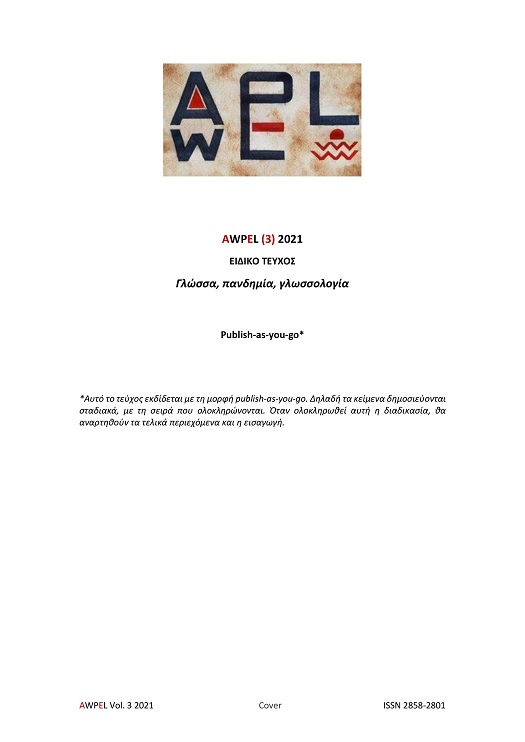Αφηγηματικές όψεις νομιμοποίησης/αντίστασης σε χιουμοριστικά τραγούδια για την πανδημία: Μια πρόταση κριτικού γραμματισμού
Abstract
Στόχος του άρθρου είναι να καταδείξει πώς τα κείμενα μαζικής κουλτούρας με κεντρική θεματική τον κορονοϊό μπορούν να αξιοποιηθούν στην εκπαιδευτική διαδικασία για την ανάπτυξη της κριτικής γλωσσικής επίγνωσης. Ειδικότερα, αναλύονται δύο βίντεο κλιπ κωμικών τραγουδιών του Θέμου (Apicos) Ρίζου, με έμφαση στα καθεστώτα αλήθειας τα οποία αναπαράγουν ή/και αμφισβητούν. Με επίκεντρο τη σημειωτική (γλωσσική και οπτική) αναπαράσταση, αποκαλύπτεται πώς το χιούμορ συμβάλλει καταλυτικά τόσο στην κατασκευή ταυτοτήτων νομιμοποίησης όσο και αντίστασης απέναντι στις ηγεμονικές μορφές διαχείρισης της «αλήθειας».
Article Details
- Come citare
-
Καραχάλιου Ρ. (2022). Αφηγηματικές όψεις νομιμοποίησης/αντίστασης σε χιουμοριστικά τραγούδια για την πανδημία:: Μια πρόταση κριτικού γραμματισμού. Aegean Working Papers in Ethnographic Linguistics, 3, 247–272. Recuperato da https://ejournals.epublishing.ekt.gr/index.php/awpel/article/view/30238
- Sezione
- Articles

TQuesto lavoro è fornito con la licenza Creative Commons Attribuzione 4.0 Internazionale.
Authors who publish with this journal agree to the following terms:
Authors retain copyright and grant the journal right of first publication with the work simultaneously licensed under a Creative Commons Attribution licence that allows others to share the work with an acknowledgement of the work's authorship and initial publication in this journal.
Authors are able to enter into separate, additional contractual arrangements for the non-exclusive distribution of the journal's published version of the work (e.g. post it to an institutional repository or publish it in a book), with an acknowledgement of its initial publication in this journal.
Authors are permitted and encouraged to post their work online (preferably in institutional repositories or on their website) prior to and during the submission process, as it can lead to productive exchanges, as well as earlier and greater citation of published work (See The Effect of Open Access).



